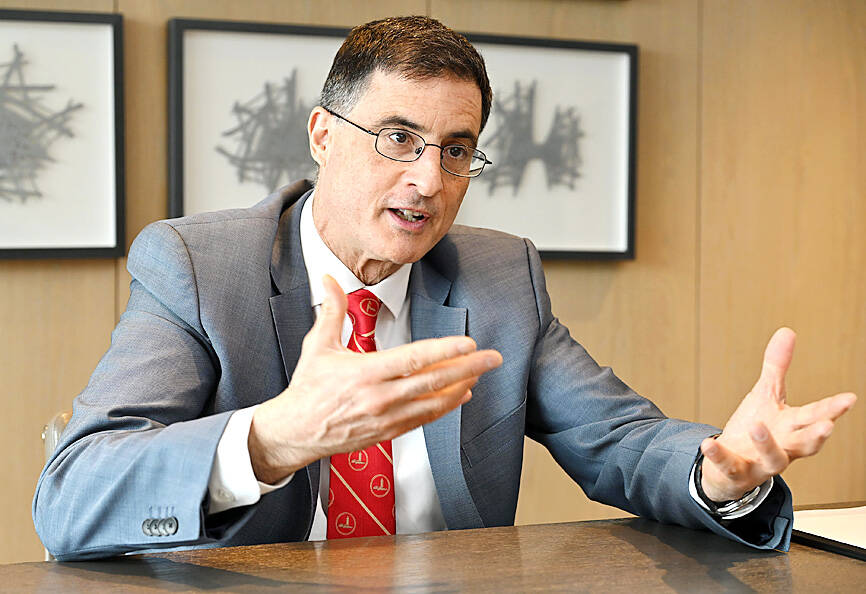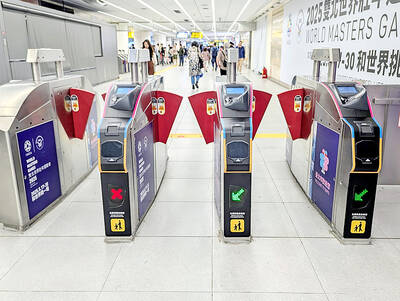Taiwan is a significant democracy that is important to the global community, Hoover Institution deputy director Eric Wakin said in a recent interview with the Liberty Times (the sister paper of the Taipei Times).
“Taiwan’s democratization has been quite amazing,” he said during a visit to Taipei.
Wakin said he was in middle school when he learned about the first Taiwan Strait crisis, which sparked his interest in cross-strait affairs.

Photo: Chang Chia-ming, Taipei Times
He had been curious about how Taiwan developed from an authoritarian society to one of the most successful democracies, which is something he hoped to better understand by studying the diaries of former presidents Chiang Kai-shek (蔣介石) and his son Chiang Ching-kuo (蔣經國).
“Taiwan’s democratic society is important to the world, and it’s important for the world and the people of Taiwan to understand this,” he said.
Wakin said that visiting Kinmen County in particular made him aware of Taiwan’s proximity to China, and helped him understand the significance of the nation’s struggle to hold on to the area during the 1950s.
He said he lamented that many Americans no longer remember the state of Taiwan-US relations from 1950 to 1978, as well as their bilateral military cooperation during that period.
In addition to cross-strait relations, academics interested in Taiwan should study its relations with neighboring countries, he said.
For example, researchers could compare the process of democratization in Taiwan with those of Japan and South Korea, exploring how historical context can inform developments in those countries and how that understanding could improve cooperation, he said.
Dialogue between the US and countries in the Indo-Pacific region would be important, Wakin said, adding that if like-minded nations cannot form strong alliances, autocratic states with radically different worldviews might emerge.
People can use the Hoover Institution’s archives to learn about relationships between the US and its allies, and its disputes with China, to understand how to avoid war and maintain world peace, he said.
The institution was originally founded to provide historical documents collected about war, he said.
During World War II, communists and nationalists with different ideologies joined forces to resist a fascist invasion in China, and that mentality should inform cooperation in the modern age, he said.
However, as people seek ways to cooperate, they must also recognize and defend the values of a free society, he said.
Wakin, who is also director of the institution’s library and archives, visited Taiwan for the fifth time earlier this month.
He said the visits were aimed at enhancing cooperation with Taiwanese academic institutions.
Aside from meeting with officials at the Ministry of Foreign Affairs, the National Security Bureau, Academia Sinica and the Chiang Ching-kuo Foundation for International Scholarly Exchange, he also visited the Ministry of National Defense, where he signed a memorandum of understanding on cooperation with a military museum that is under construction in Taipei.
Wakin also talked about the institution’s research on China and Taiwan, saying that its collection on the region started with documents donated by former US president Herbert Hoover, who founded the think tank in 1919.
Hoover’s documents were from China’s Qing Dynasty following the outbreak of the Boxer Rebellion, which occurred while Hoover was in Tianjin.
Those materials helped many researchers in the US better understand China, and today, many who visit the institution are interested in reading copies of the diaries of the Chiangs held at the Hoover Institution Library and Archives, Wakin said.
There has also been cooperation with Taiwan in many other areas of research, he added.

A magnitude 6.4 earthquake struck off the coast of Hualien County in eastern Taiwan at 7pm yesterday, the Central Weather Administration (CWA) said. The epicenter of the temblor was at sea, about 69.9km south of Hualien County Hall, at a depth of 30.9km, it said. There were no immediate reports of damage resulting from the quake. The earthquake’s intensity, which gauges the actual effect of a temblor, was highest in Taitung County’s Changbin Township (長濱), where it measured 5 on Taiwan’s seven-tier intensity scale. The quake also measured an intensity of 4 in Hualien, Nantou, Chiayi, Yunlin, Changhua and Miaoli counties, as well as

Credit departments of farmers’ and fishers’ associations blocked a total of more than NT$180 million (US$6.01 million) from being lost to scams last year, National Police Agency (NPA) data showed. The Agricultural Finance Agency (AFA) said last week that staff of farmers’ and fishers’ associations’ credit departments are required to implement fraud prevention measures when they serve clients at the counter. They would ask clients about personal financial management activities whenever they suspect there might be a fraud situation, and would immediately report the incident to local authorities, which would send police officers to the site to help, it said. NPA data showed

ENERGY RESILIENCE: Although Alaska is open for investments, Taiwan is sourcing its gas from the Middle East, and the sea routes carry risks, Ho Cheng-hui said US government officials’ high-profile reception of a Taiwanese representative at the Alaska Sustainable Energy Conference indicated the emergence of an Indo-Pacific energy resilience alliance, an academic said. Presidential Office Secretary-General Pan Men-an (潘孟安) attended the conference in Alaska on Thursday last week at the invitation of the US government. Pan visited oil and gas facilities with senior US officials, including US Secretary of the Interior Doug Burgum, US Secretary of Energy Chris Wright, Alaska Governor Mike Dunleavy and US Senator Daniel Sullivan. Pan attending the conference on behalf of President William Lai (賴清德) shows a significant elevation in diplomatic representation,

The Taipei MRT is to begin accepting mobile payment services in the fall, Taipei Rapid Transit Corp said on Saturday. When the company finishes the installation of new payment units at ticketing gates in October, MRT passengers can use credit cards, Apple Pay, Google Pay and Samsung Pay, the operator said. In addition, the MRT would also provide QR payment codes — which would be compatible with Line Pay, Jkopay, iPass Money, PXPay Plus, EasyWallet, iCash Pay, Taiwan Pay and Taishin Pay — to access the railway system. Currently, passengers can access the Taipei MRT by buying a single-journey token or using EasyCard,